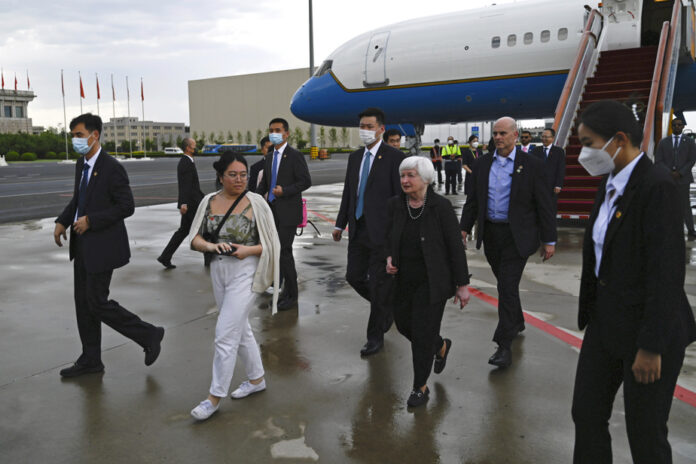(Beijing) US Treasury Secretary Janet Yellen arrived in Beijing on Thursday for a visit whose stated objective is to improve trade destabilized by the growing rivalry between the two leading world powers.
His plane landed in the Chinese capital shortly after 5 p.m. (5 a.m. Eastern time), an AFP journalist noted.
On the tarmac, Yellen was greeted by US Ambassador Nicholas Burns and a senior official from the Chinese Ministry of Finance, Yang Yingming.
This trip, scheduled until Sunday, is the first in China for Janet Yellen since she has been in this position. It comes weeks after a similar visit by his colleague at the State Department, Antony Blinken.
The visit had been planned for a long time, but could not materialize after the renewed tension caused by the affair of the Chinese airship shot down over American territory.
This is an opportunity to move forward with the idea of a summit between the two countries, US President Joe Biden having stressed that he was hopeful of meeting his Chinese counterpart, Xi Jinping soon.
The objective is to extend the means of exchange between the two countries, to avoid reciprocal misinterpretations and to expand cooperation on subjects related to the world economy, global warming or the debt crisis in emerging and developing countries, according to the US Treasury.
On Friday, Ms. Yellen is to be received by Premier Li Qiang, meet with former Vice Premier Liu He and attend a dinner hosted by former Governor of China’s Central Bank Zhou Xiaochuan, the official said. on condition of anonymity a senior Treasury official to reporters.
Analysts are also betting on an exchange with the new Chinese Vice Premier, He Lifeng, appointed last March.
The visit, which comes against a backdrop of difficult economic recovery on the Chinese side and rising rates on the American side, should also allow the two partners and rivals to sound out their respective growth prospects.
The fact that Ms. Yellen is “spending four days in Beijing, amid strong domestic and international pressures, underlines the importance she attaches to this visit”, comments to AFP Wendy Cutler, vice-president of the Asia Society (ASPI), a US-based think tank.
While there is no shortage of areas of discontent on both sides and leaves little room for manoeuvre, the visit should also lay the groundwork for future cooperation, according to Cutler.
This visit is part of American efforts to “rethink” the relationship between the two superpowers, both diplomatically and in other areas, judge for her part the researcher Lindsay Gorman, of the American think tank German Marshall Fund (GMF).
Latest example, the White House is preparing to limit access to American cloud computing services to Chinese companies, according to the Wall Street Journal on Wednesday.
“You have to take into account the new reality of this strategic competition,” says Ms. Gorman, noting that Janet Yellen has so far only talked about competition, even if this includes issues of security and values, such as human rights. the man.
Technology export control issues and competition measures “which currently dominate the political agenda” will be at the center of the discussions, she predicts.
On Monday, China responded by announcing restrictions on exports of two rare metals needed to make semiconductors, a reminder that a possible shift in relations will take time.
Janet Yellen could be the person best placed to smooth things over, Lindsay Gorman believes, however.
The reasons for tensions between the two countries on economic issues persist, even more so after the decision of the American president, Joe Biden, to restrict the possibilities of American investments in China when it concerns technologies deemed sensitive.
Washington is also concerned about “coercive actions and uncompetitive practices,” and is considering corrective action, according to a Treasury official.
Other areas of friction include recent changes to China’s anti-espionage law, which vaguely prohibits the transfer of information related to national security.
Other subjects, on the other hand, seem conducive to cooperation, starting with the excessive indebtedness of third countries.
The United States has thus welcomed progress on Zambia’s debt, the restructuring of which has been validated by creditors, first and foremost China, after similar progress in Sri Lanka.
Washington is insisting that bilateral creditors act quickly to prevent these debt problems from getting worse, after accusing China of dragging its feet in the past.















